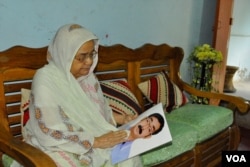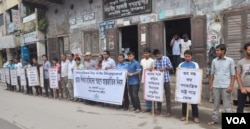Ruhul Amin, a street hawker in the Bangladesh capital of Dhaka, has desperately searched for his missing son for four years.
Mohammad Imam Hassan was kidnapped in 2012 – and rescued the next day by Bangladesh’s Rapid Action Battalion. But the paramilitary force still hasn’t freed the man.
"When I went to the officers of RAB seeking return of my son, they demanded 100,000 takas," Amin told VOA. But the amount, equivalent to $1,276, was more than he could afford. "I said I was very poor and finally I paid 40,000 takas ($510) to them. Despite their promise to return my son to me within a few days, I have not got back my son as yet."
Amin sought help from "security agencies, the high court and the human rights groups, but no help came my way," he said. "… I know nothing of his whereabouts. I don’t even know whether he is dead or alive."
Routine practice
Hassan’s case is not an isolated one in Bangladesh. The Bangladeshi human rights group Odhikar reports that, in the past five years, at least 298 people have vanished through enforced disappearances. Of those, 39 were found dead and 138 returned alive. The rest have not been seen.
The group counted and documented only cases in which witnesses alleged the victims were taken by men who appeared to be from law enforcement agencies.
Another Bangladeshi rights group, Ain-o-Salish Kendra (ASK), counted at least 70 victims of enforced disappearances between January and September of this year, up from 55 through all of last year.
"Following our fact-finding work, in many cases we strongly suspect that the law enforcement agencies of the state were involved in the enforced disappearances," ASK executive director Nur Khan told VOA.
Opposition targets
Allegations of enforced disappearances began surfacing in Bangladesh soon after Sheikh Hasina Wazed led her Awami League (AL) to power in 2009. She remains prime minister.
Human rights groups say about half the victims have been leaders and workers of the Bangladesh Nationalist Party (BNP)-led opposition alliance.
BNP Joint Secretary General Ruhul Kabir Rizvi Ahmed accused the government of victimizing his party members.
"We are sure that these disappearances are the handiwork of the law enforcement agencies, and these activities are being supported by the state," Ahmed said. "In the past seven years, the BNP-led alliance [has had] at least 70 leaders and workers, including two former members of parliament, disappeared this way. The law enforcement agencies are indulging in such inhuman activities following the command of the government, to protect the interest of the ruling party."
A government spokesman rejected the charge.
Home Minister Asaduzzaman Khan Kamal said the allegation that the government is pursuing a policy of "enforced disappearance is totally baseless." He said security agencies investigated many cases of alleged enforced disappearances and found that individuals had gone into hiding on their own "to embarrass the government globally."
BNP leader AKM Wahiduzzaman said enforced disappearances are taking place in the country "mostly to annihilate the opposition force."
"These enforced disappearances are aimed at taking away the political rights of the opposition parties. Those opposition party members, who are critical of the government over many issues and are exposing its malpractices, are turning the victims of the enforced disappearance," Wahiduzzaman told VOA. "The law of the land will come into effect to deal with the cases of enforced disappearances when the regime changes. It will seek to ensure justice to the families who have lost their near and dear ones."
Human rights concerns
Phil Robertson, Asia deputy director of Human Rights Watch, said his group recently issued a statement protesting the alleged enforced disappearance in August of three sons of Bangladeshi opposition leaders.
"There is clear evidence that the three men are in government custody, but shockingly the authorities continue to deny holding them, and there has been no further news about them or their whereabouts since their arrests," Robertson said.
"In the buildup to the January 2014 elections, thousands of opposition party members were arrested and labeled as terrorists for their alleged participation in election-related protests. Sheikh Hasina and her government have continuously blurred the line between opposition political party members and terrorist or militant forces."
Legal rights activist Mohammad Ashrafuzzaman, liaison officer of the Hong Kong-based Asian Legal Resource Center (ALRC), blamed the police and judiciary for the rise in enforced disappearances.
“In Bangladesh, the justice institutions appear to be designed to protect the status quo, siding [with] the powerful elites of the day. As long as the police and judiciary complement each other to protect the agenda of the incumbent government, it’s difficult to see an end to this practice of enforced disappearances in the country,” Ashrafuzzaman told VOA.
Robertson said Bangladesh’s practice of ensuring impunity for security forces to abuse rights, combined with the government’s reliance on those abusive practices, creates an environment in which enforced disappearances and other violations can continue.
For now, Ruhul Amin and others like him will keep searching for their missing loved ones.






